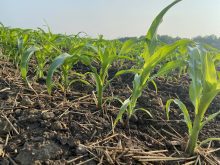The AGGrowth Coalition “demands” the federal government provide “support for… export-oriented farmers facing significant market disruptions as a result of global trade action,” but hasn’t provided documentation of how much trade problems have hurt Canadian farmers.
The coalition and others are working on that, AGGrowth co-chair and Grain Growers of Canada chair Jeff Nielsen said in an interview Aug. 27.

“I’d say a lot of work is being done,” he said, including by canola and soybean groups, which saw their exports to China all but stop earlier this year.
AGGrowth wants improvements to AgriStability, a federal-provincial program that’s supposed to offset losses in farm income, but in an Aug. 26 interview Grain Growers vice-chair Markus Haerle said some ad hoc aid might be needed too.
China was Canada’s biggest canola seed export buyer but in March it all but stopped importing Canadian canola.
University of Manitoba agricultural economist Derek Brewin says canola prices have dropped about $80 a tonne ($1.81 a bushel) or 16 per cent since January. But there is no publicly available analysis on how much of the decline is due to China’s trade action versus normal market factors.
Read Also

Trade uncertainty, tariffs weigh on Canadian beef sector as market access shifts
Manitoba’s beef cattle producers heard more about the growing uncertainty they face as U.S. tariffs, and shifting trade opportunities, reshape their market.
Presumably Canadian canola and soybean prices have also been hurt by the United States-China trade war, which has seen U.S. soybean exports to China, its biggest market, dry up.
The American government is subsidizing its soybean growers to offset lower prices. That arguably hurts Canadian soybean farmers who also earn less and aren’t getting a subsidy to offset it.
However, given the culling of millions of Chinese pigs infected with African swine fever, China might have substantially cut soybean imports anyway.
Nielsen said AGGrowth is frustrated the federal government hasn’t started to improve AgriStability.
“Farmers dropped it (AgriStability) like a hot potato because it wasn’t working,” he said. “It got watered down until it was not effective.”
If the government wants Canadian agri-food exports to hit $75 billion by 2027 to bolster Canada’s economy, it must provide programs that help reduce risks that farmers can’t control, Nielsen said.
AGGrowth is seeking a return to coverage at the 85 per cent of historical reference margins, expanded coverage for livestock and horticulture crops, discussions focusing on program effectiveness not funding levels and a government-industry working group to allow farmer input into analysis.
In an email response federal Agriculture Minister Marie-Claude Bibeau’s office noted the federal government’s enhancement of cash advance programs and work to restore exports and develop new markets.
“Canada’s focus is on reopening markets as soon as possible,” the official wrote.
















